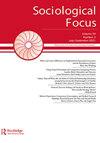How the Incomplete Medicalization of Cannabis Shapes Patient Experiences
Q2 Social Sciences
引用次数: 0
Abstract
ABSTRACT The medicalization of cannabis is currently described as incomplete in that it is not firmly under the control of biomedicine and because the medical definition coexists with other constructions of the plant, namely the recreational and criminal. This study examines how this incomplete medicalization is experienced by considering the sentiments expressed in five focus groups of cannabis patients (N = 21). Results indicate patients perceive both advantages and disadvantages to the incomplete medicalization of cannabis. Patients report that the current structure of state medical cannabis programs restores person control, allowing them to reduce their reliance on pharmaceuticals while driving them to learn more about their health and treatment options. Yet patients also report negative experiences with mainstream healthcare providers ranging from scorn to discrimination. Nonetheless, patients in this study desire that state-endorsed medical cannabis programs continue in a post-prohibition society because the advantages are interpreted as outweighing any disadvantages.大麻的不完全药物化如何影响患者体验
大麻的医学化目前被描述为不完整的,因为它不受生物医学的控制,因为医学定义与植物的其他结构共存,即娱乐和犯罪。本研究通过考虑大麻患者(N = 21)的五个焦点小组表达的情绪,探讨了这种不完整的医疗化是如何经历的。结果表明,患者认为大麻不完全医学化的优点和缺点。患者报告说,目前国家医用大麻方案的结构恢复了个人控制,使他们减少了对药物的依赖,同时促使他们更多地了解自己的健康和治疗方案。然而,患者也报告了主流医疗服务提供者的负面经历,从蔑视到歧视。尽管如此,在这项研究中,患者希望国家认可的医用大麻计划在禁令后的社会中继续下去,因为其优点被解释为超过任何缺点。
本文章由计算机程序翻译,如有差异,请以英文原文为准。
求助全文
约1分钟内获得全文
求助全文

 求助内容:
求助内容: 应助结果提醒方式:
应助结果提醒方式:


